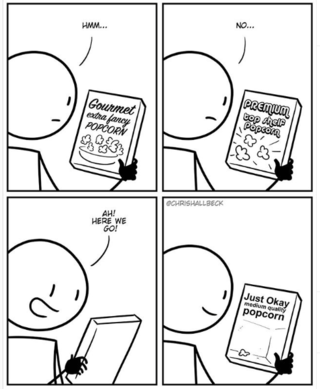Self-Esteem
How Does Self-Esteem Influence Consumer Behavior?
New research helps to explain who buys inferior products and why.
Posted March 10, 2020 Reviewed by Abigail Fagan
By Anika Stuppy, Ph.D., of Tilburg University.
Products can make people feel great about themselves. Enjoying an exquisite glass of wine in a fancy bar or walking down the street in a new stylish outfit sure sound like great ways to give your ego a little boost.
But if people consume to feel great about themselves, why do so many people shop at Walmart, get their hair cut at Supercuts, or prefer dressing down to go to a dive bar? Have you ever seen a miserable looking restaurant and wondered, “Why doesn’t this place go out of business?” Who chooses inferior products, and why?
One obvious reason is that some people are just frugal. For some, saving money is more important than boosting their self-image. Yet for others, inferior products may take on a deeper meaning. Do inferior products reveal something about how consumers see themselves and how they want to be seen?

In fact, they do. In a recently published paper, my co-authors and I found that people with low self-esteem, those who hold pessimistic self-views, choose inferior products. For instance, people with low self-esteem preferred cheap vodka in a plastic bottle over premium vodka, and they were more willing to visit a dingy restaurant when it was framed as uncool rather than the cool place to be. People with low self-esteem were even willing to eat 5-day old popcorn, rather than freshly popped popcorn, while watching a movie clip.
Why do people with low self-esteem prefer inferior products? To find out, we conducted an additional study. In this survey, participants decided whether to enter a lottery to win a gift voucher for a basic hair salon in a strip mall (think Supercuts) or a premium hair salon (think Toni & Guy).
Next, we asked them to explain the reasons for their choice. People with low self-esteem not only preferred to enter the lottery for the basic hair salon, but they also stated that this salon seemed like a better fit for them, was more appropriate for people like them, and would make them feel like they belonged there.
People with low self-esteem pick inferior products because those products resonate with how they feel about themselves. They identify with low-tier brands because those brands match their pessimistic self-views. They eat stale popcorn because they think it is good enough for them. They consume within their league rather than outside of their league.
You may be thinking, “Wow, that’s sad!” But hold on a second. Choosing what fits, rather than what doesn't, could have important benefits for people with low self-esteem. Just think back to a time when you did not get the job you wanted, or when you felt rejected by someone you really liked.
When you’re feeling lesser than other people, it can feel weirdly comforting to eat stale popcorn while wearing your favorite t-shirt and sweatpants. Indeed, it could feel threatening to get dressed up for a fancy meal because it feels phony to present such an unrealistically positive image to the world. Signaling to others that one is confident and competent, while feeling inferior inside, may even put some people at risk for damaging their self-views even further.
To sum up, for people with low self-esteem, inferior products are like a protective shield. People who feel inferior surround themselves with inferior products because those products feel familiar and safe. Whether inferior products help or hurt people with low self-esteem in the short and long run is still unknown.
But the next time you feel miserable and find yourself reaching for that equally miserable microwave dinner, perhaps ask yourself, “Is this really what I want to eat?” If yes, dig in. If not, then take a step back and try to figure out what you need. It might just be a hug!
References
Stuppy, Anika, Nicole L. Mead, and Stijn M. J. van Osselaer (2020), “I am, Therefore I Buy: Low Self-esteem and the Pursuit of Self-Verifying Consumption,” Journal of Consumer Research, 45 (5), 956-73.


